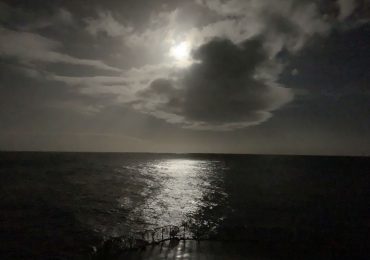The JRB presents new short fiction by Julie Nxadi.
Love Back
Kwathi kaloku ngantsomi, there were clouds too lazy to bring a storm. Sagging, low and grey, they writhed over thorn bushes.
There was a horizon, that whispered and waved long, khaki-coloured, dry grass (just a shade lighter than the clay roads that had been bleached and hardened by months of unrelenting sun).
There is uLoli, nine years old, walking angrily home.
The wind mocks her as she walks. It lifts her taffeta dress in gusts, flicks the puff of hair at the top of her head, and disturbs the baby hairs she had so carefully slicked down before she left the house.
But she walks.
Determined.
Her brow is furrowed. Her lips are pursed. Her fists, balled.
A drop of water slips from a cloud’s grasp and lands on her swinging arm and she rubs it away impatiently.
Heaven has played this game before, this game of empty promises. Taunting this cracked community.
uLoli’s arms swing presto to the rhythm of her clacking heels as she storms past the Dlanga homestead where barrels have been set outside in anticipation of relief.
‘Idiots!’ she spits.
(Shards of her heart still falling into her stomach.)
‘Soze kuphinde kunethe.’
The words burn across her eyes and bleed out of her nose. Some invisible flame has wrapped itself around her throat. Some silent drum is beating in her ears. Some fat man is sitting on her bladder. She does not know the name of this feeling, and does not care to know it by name.
She walks harder.
There is no use in fixing her pantihose which are slipping and bundling around her ankles.
She is almost home.
And when she is home she will pull off these ill fitting clothes;
This dress, too loose across her shoulders, these shoes too tight around her toes.
She will let loose the thousands of curls she fought into a ponytail on her head and roll down her baggy pantihose.
In the meantime, she rubs off the Vaseline glossed on her lips with the back of her hand.
On she goes, swatting away the wind when it tugs at the many layers of her white Christmas dress (too fancy for a Thursday afternoon in October). But the wind gets its revenge by gathering her scent across her skin and pushing it up into her face, drowning her in the smell of iyeza. The smell reminds her of the scolding, pink water she stood in that morning. The pink water, with dried leaves gliding across its surface, that promised a cure, or at the very least, a disguise. A promise to either be healed of misfortune or to be hidden from it.
When the clouds gather like this, people retreat into their houses as if to give the heavens some privacy, but uLoli tumbles alone across the village like an omen.
She had been sent on a mission to get her father’s love back. Washed in iyeza, to mask izothe that her mother says she was born with, she was to stand before him and pull him back from indifference. Her mother gave her a strong bouquet to put in her bath water and told uLoli she would know him when she saw him. A tall man, handsome man, she said. She said uLoli was to wear her best dress and not to look desperate. She was to soften her eyes and smile, rather than to look so ripe and weathered. To genuflect. To show him her school report.
Her school report!
uLoli stops and something slams against something else in her chest. The wind pulls her around making her look back at the long road she has just walked. She opens her fists as if expecting to see the folded paper in one of her hands. There is nothing. She cannot even imagine where she may have lost it. Narrowing her eyes she tries to think but cannot remember anything beyond her father’s words.
‘Xelela unyoko ukuba izinto zokudlala zibhalwe “Made in China”.’
uLoli’s eyes dart aimlessly across the air in front of her, settling on nothing, focusing on nothing, looking at everything. Another drop of water lands on her cheek awakening her to reality: She has lost her school report, umakhulu’s favourite thing to read after the Bible. She begins to take strides back the way she came but slows as she remembers that her mother told her not to let umakhulu beat her home. She is surely on her way back from the Mother’s Union meeting now and she cannot know that uLoli wore her Christmas clothes, or that she went to her father’s house, or that she washed in medicine (umakhulu does not believe in second chances). uLoli slows to a stop. She turns around once more and starts to storm home again.
‘Iyhuuuuu!’ she sighs as her lungs ache themselves empty, ‘uzakuphambana umakhulu!’
Her insides are displaced by rage and fear. She knows where the fear belongs; she knows umakhulu’s heavy hand. The rage, however, is harder to place.
She walks harder.
The wind stops.
A dark spot appears on the ground before uLoli.
And then another.
And another.
And then the rain comes like a tantrum.
uLoli begins to run as the water barges from an overwhelmed sky. She growls as she runs, thinking about the tall fat man whose fault this is. Her school report was surely somewhere in his yard, tumbling aimlessly and unwanted. She did not even make it into his house. He was outside, about to park his shiny red Corolla in the garage when he saw her open the gate. He lifted his hand and said, ‘Yima apho!’ He walked to her and then gazed thoughtfully at nothing located on the horizon. ‘Uthini?’ he asked, as if they had spoken before. uLoli responded with her name, her surname, her grade, the name of her school, and a smile. That is as far as she got. He told her there was nothing of hers there and asked her to give her mother a message: ‘Xelela unyoko ukuba izinto zokudlala zibhalwe “Made in China”.’ uLoli did not quite understand but said she would pass on the message. He turned and walked away from her. The meeting was over. She will pass on the message and it will be the last thing she does for him. It will be the last thing she does for her mother, too.
She runs, her dress clinging to her skin. Her body is vibrating with the sound of her mind screaming profanities. She looks down to see her shoes and pantihose begin to coat in mud. uLoli stops running and the rain cheers loudly at her defeat. Lifting her dress, she pushes her pantihose carefully down her legs to her ankles. She climbs out of them and stuffs them into one of her shoes and then begins to walk quickly and carefully, shoes in hand. The rain beats against the thirsty earth with such force that bits of mud leap up and cling to the hem of uLoli’s white dress. She stops again, puts down her shoes and pulls the dress over her head, turning it inside out. She rolls the dress into a wet, puffy bundle and tucks it under her arm.
On she goes.
‘Soze ndiphinde ndivase ngayeza mna,’ she growls, her vest and panty like wet tissue against her skin. Promise after promise, she shouts to herself. Tomorrow she will go back to playing at the quarry with uPhalo.
Tomorrow she will go back to playing, she doesn’t care who says what.
She will go back to playing.
uLoli is not running anymore and she does not know when she stopped running.
She arrives at the gate and opens it. Her hands are wrinkled and grey and the goosebumps on her arms look permanent.
The house is quiet under the sheets of rain that hiss outside. She drips her way across the tiles. Standing in the kitchen, she fills her lungs with the warm of the house and glances down the passage into the room where her mother sleeps peacefully on her single bed. uMakhulu is not back yet. uLoli sighs as she looks in the kitchen drawers for a plastic bag. She finds one and shoves all of her wet clothes into the bag.
A calm takes her by the hand and leads her gently out of the house back into the rain.
Towards the toilet they walk, uLoli and her calm, where she drops the plastic bag into the darkness. The rain whispers on as she walks back to the house.
uMakhulu will never ask about something she cannot see
(how it got wet, why it was worn, how it got stained),
uLoli will not speak of things umakhulu does not know
(how she got wet, why she is worn, how she got stained).
She does not know how she knows that this is forgotten now. All that she knows is that she is sure.
She looks up to the sky.
The rain stops.
- Julie Nxadi is an observer, thinker and a writer, born in East London and now based in Cape Town as a fellow at the Centre for Humanities Research at the University of the Western Cape. Follow her on Twitter @julie_nxadi
© Julie Nxadi, 2017






I love it.
Well written. I could see and feel the rain on umzimba kaLoli. Such a sad an beautiful story.
As a black girl it reminds me of all the times I sacrificed myself for my Mother’s happiness.
This is sad but yet so true. So descriptive, well written…I could see uLoli with the wind and with the rain. Thank you for this awakening to just how far children are willing to go for their parents…